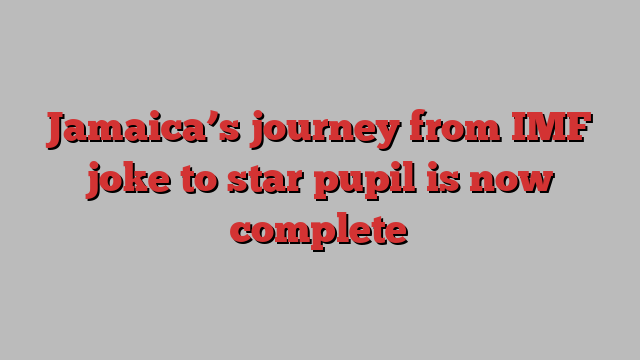
Stay informed with free updates
Simply sign up to the Global Economy myFT Digest — delivered directly to your inbox.
When Jamaica signed its last IMF programme in 2013, most of the Fund’s staff were so sure it would fail it that they often opened internal follow-up meetings with a sardonic joke: “Has Jamaica crashed yet?”.
Scepticism was understandable. Jamaica had by then spent most of its time as an independent country in some form of IMF programme. Its economy had been stagnant for decades, and government debts reached a frankly stupid 144 per cent.
Some thought that Jamaica’s 16th IMF programme was simply a cynical ploy to keep the show on the road long enough for the Fund to extract more of its resources already tied up in the country from old failed programmes.
A decade later, Jamaica is taking over the IMF (kinda).
Kristalina Georgieva, Managing Director of the International Monetary Fund (IMF), announced today to the Executive Board her proposal to appoint Mr. Nigel Clarke to the position of Deputy Managing Director, effective October 31, 2024. He will succeed Ms. Antoinette Sayeh, who, as previously announced, steps down on September 12.
In announcing her selection of Mr. Clarke, Ms. Georgieva said:
“Mr. Clarke is an exceptional public servant and policymaker, with proven leadership in institution building and economic crisis management, who has stewarded his country’s economy to a stronger and more sustainable position.
Since 2016, he has been the IMF’s chief counterpart on successive and historically successful programs for Jamaica, including an Extended Fund Facility, a precautionary Stand-By Arrangement, and most recently a Precautionary Liquidity Line plus Resilience and Sustainability Facility, leaving the country with robust economic fundamentals. Nigel also brings a wealth of experience from a stellar private sector career.”
It’s tempting to joke that this is another example of Government Sachs, since Clarke started his career as an equity derivatives trader at the investment bank’s London office. But obviously, it’s as Jamaica’s finance minister since 2018 that Clarke has made his mark.
Jamaica’s path from butt of jokes to IMF darling was started by his predecessor Peter Phillips, of the opposition People’s National Party. It was Phillips who shepherded the country through the first grim years of the 2013 programme. He deserves credit for taking on what was undoubtedly a crap job at a crap time and doing it incredibly well. Perhaps most of the credit.
But after the Jamaica Labour Party won the 2016 election, Clarke did more than simply continue on the same path. As the IMF said in its statement:
. . . He spearheaded ambitious national reforms, including central bank independence, creation of an independent fiscal commission, as well as other tax policy, public body governance, public procurement, public sector compensation, and public investment management reforms.
He also led Jamaica’s economic policy response to the COVID-19 pandemic with innovative and well-targeted policy support and completed privatizations and public-private partnerships of major infrastructure assets.
Under his stewardship, Jamaica implemented a multi-layered disaster risk financing model, and became the first small country to independently sponsor a catastrophe bond, with World Bank assistance. In 2023, Jamaica successfully completed its first ever international issue of a local currency denominated bond.
Clarke is also very much the IMF type: a smooth, cerebral and technocratic Rhodes scholar with a PhD from Oxford. However, first-hand experience as finance minister of a programme country is clearly why he got the gig of deputy MD.
Naturally, Jamaican prime minister Andrew Holness is claiming it as a big win for his administration, the country, and the Caribbean. Which is fair enough, because not long ago the suggestion that a former Jamaican finance minister would hold one of the top IMF jobs would have seen you laughed out of 700 19th Street.
FTAV once joked that maybe Jamaica should send some of its officials to DC to sort shit out. With a lot of other big IMF programmes already an unholy mess, seemingly doomed to failure, or at least looking pretty dicey, it seems the Fund itself might agree.
Further reading:
— Inside the IMF’s outrageous, improbably successful Jamaican programme (Pt. 1)
— Inside the IMF’s outrageous, improbably successful Jamaican programme (Pt. 2)
— The Jamaican exception (FTAV)